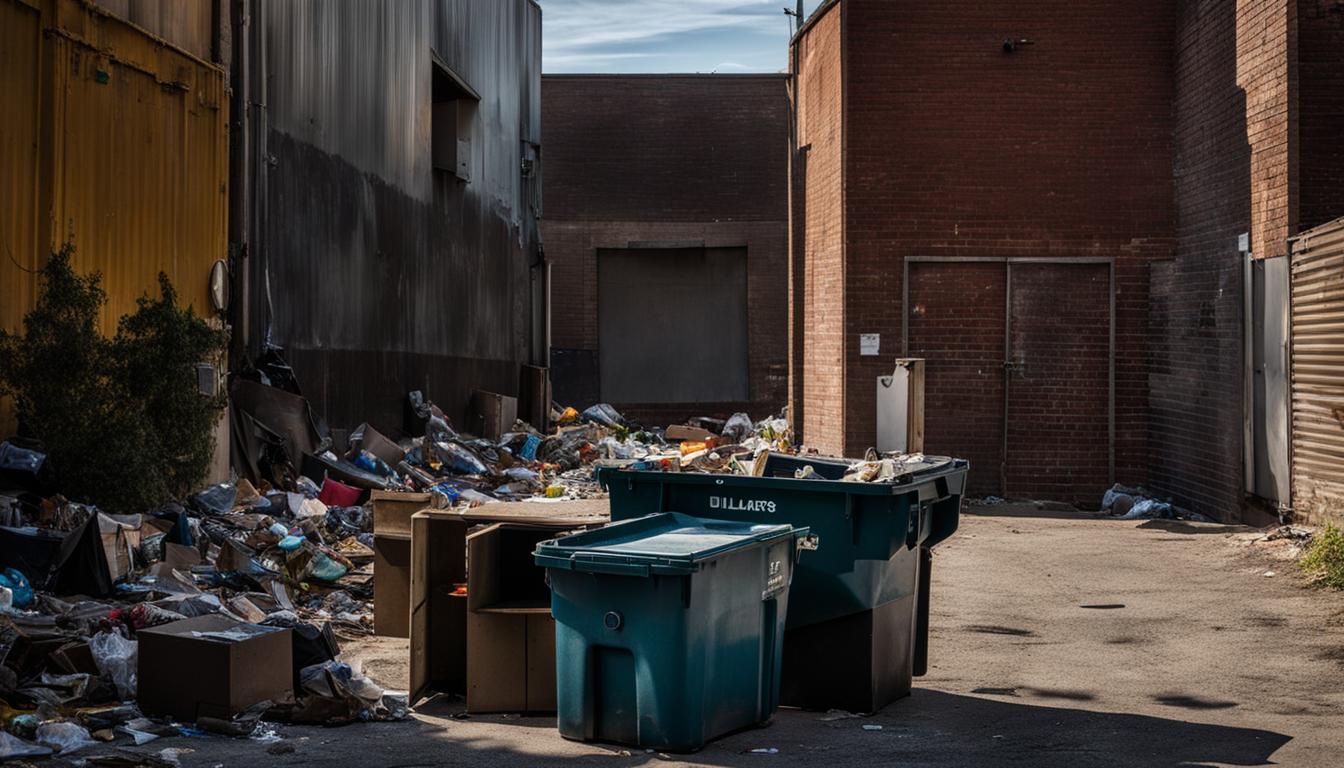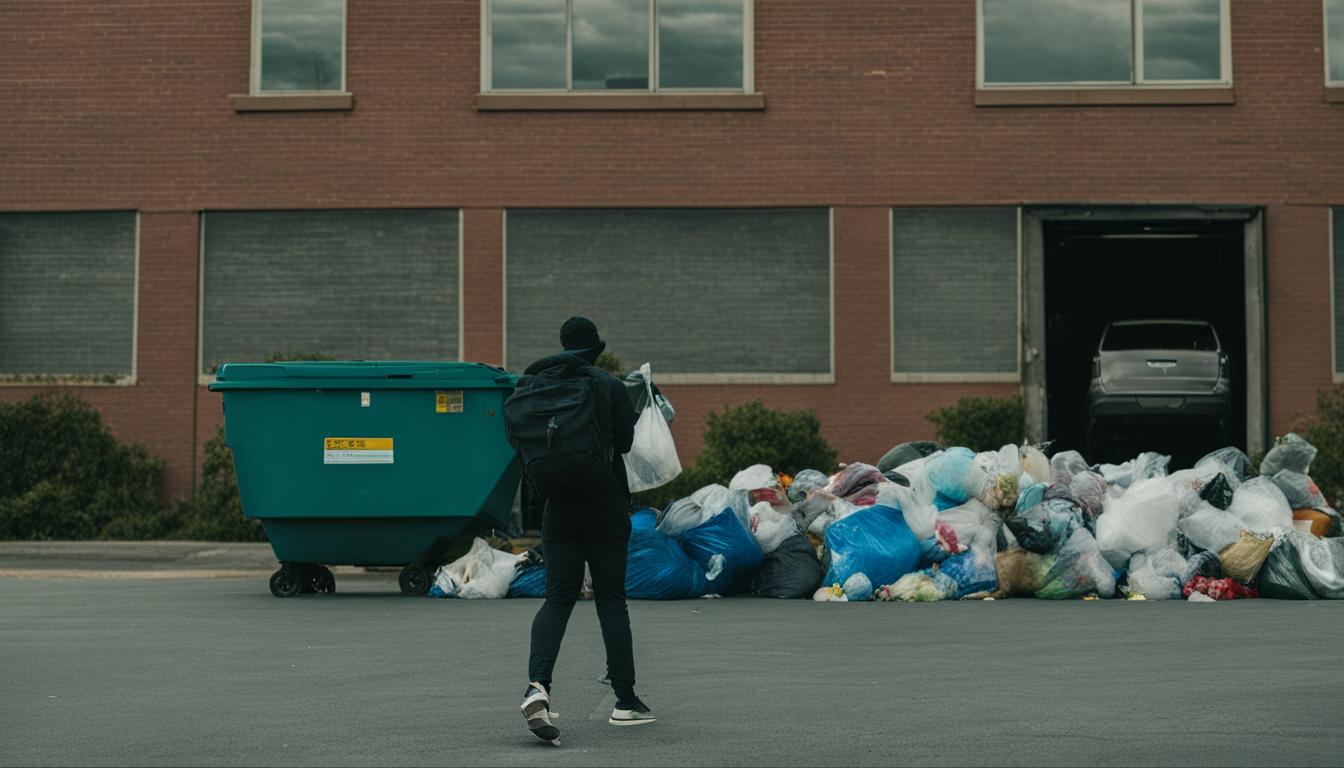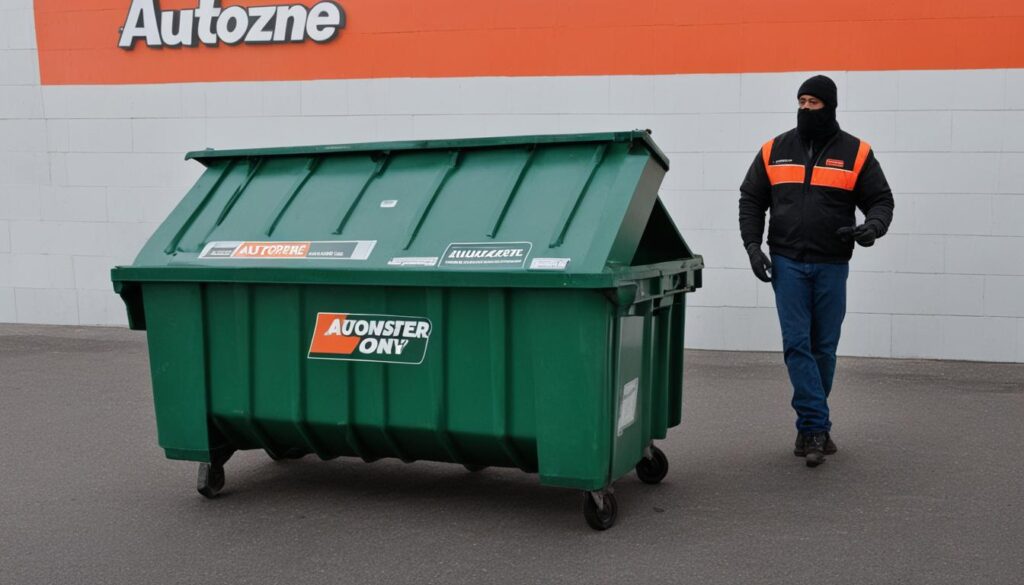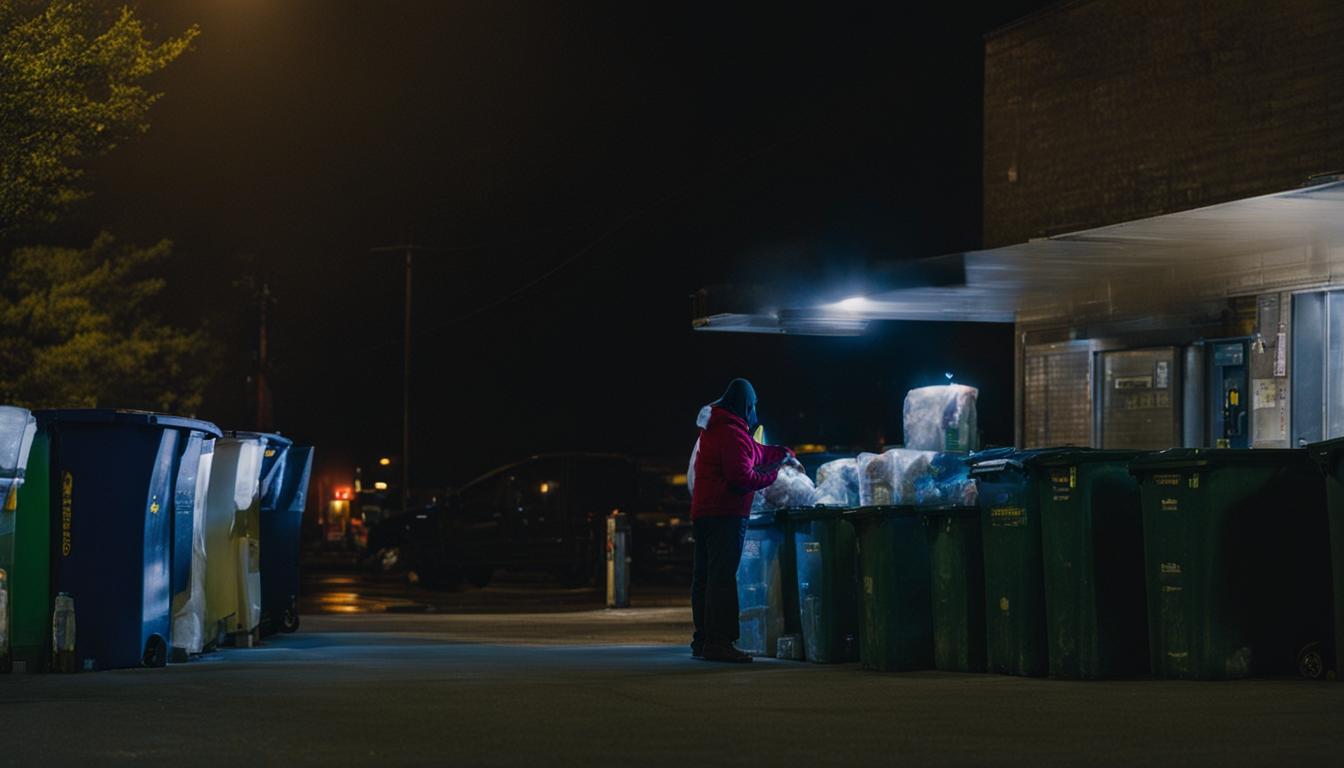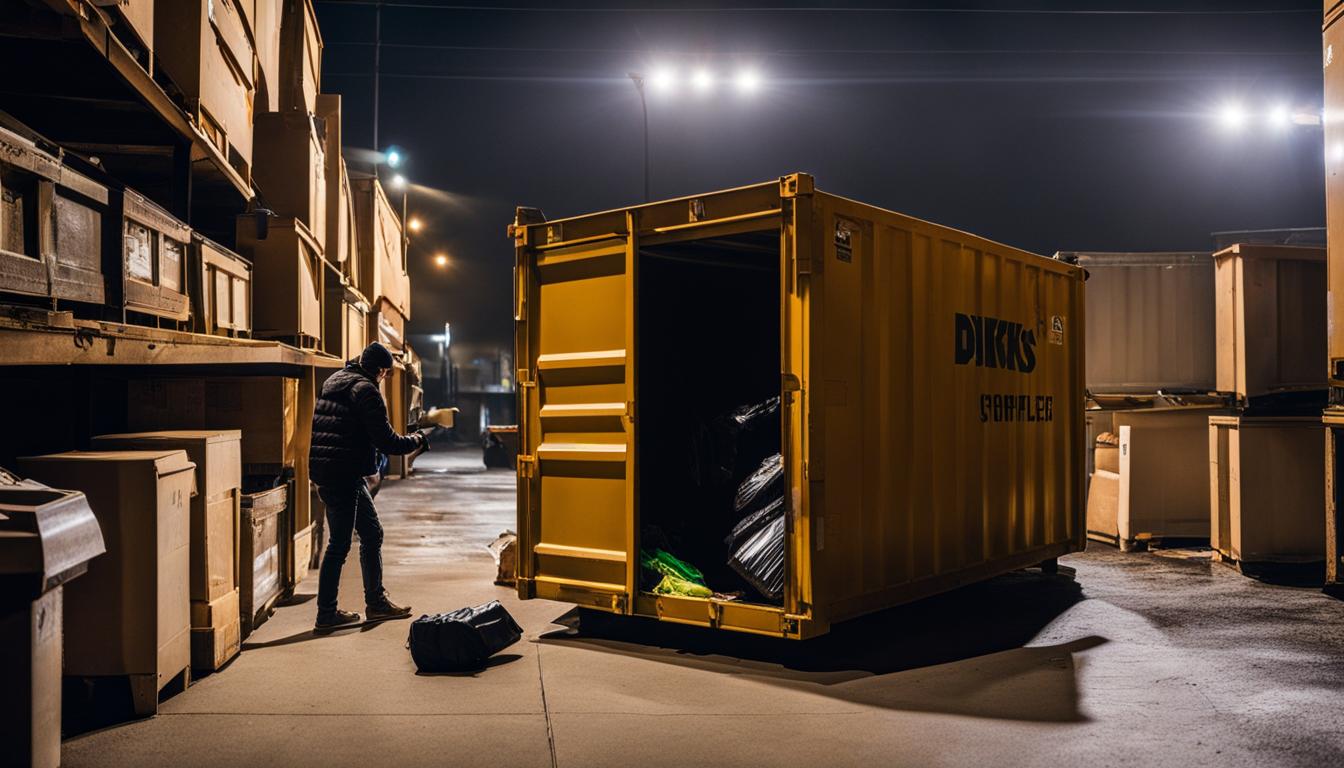Disclosure: This Post Contains Affiliate Links; We earn a commission on purchases.
When it comes to dumpster diving, it’s important to understand the norms and policies specific to each store. In the case of Dillard’s, one of the leading department stores in the United States, dumpster diving is not recommended or encouraged. While there have been instances where people claim to have found items in Dillard’s dumpsters, it’s crucial to be aware that these actions may be illegal and can have legal consequences.
Dillard’s, like many other retailers, has policies in place to prevent unauthorized access to their dumpsters. These dumpsters are intended for disposal purposes only and it’s essential to respect store policies and norms when it comes to engaging in dumpster diving activities.
Key Takeaways:
- Dumpster diving at Dillard’s is not recommended or encouraged.
- Engaging in dumpster diving activities at Dillard’s may be illegal and can have legal consequences.
- Dillard’s has policies in place to prevent unauthorized access to their dumpsters.
- Dumpsters behind Dillard’s stores are intended for disposal purposes only.
- Respecting store policies and norms is important when it comes to dumpster diving.
What Can You Find at Other Stores?
While dumpster diving at various stores may yield interesting finds, it is essential to note that engaging in this activity may not always be legal or ethical. However, people have reported discovering a range of items in dumpsters behind different stores. Here are some examples:
- Candles at Bath & Body Works
- Donuts at Krispy Kreme and Dunkin Donuts
- Brand-new makeup at Ulta
- High-end goods at Bed Bath & Beyond
- Snacks and personal care items at Walgreens
- Mint-condition planners and crafting supplies at Michael’s
- Video games at GameStop
- Clothing and home goods at T.J.Maxx & Marshalls
- Packaged snacks and household products at Dollar General
- Seeds at Dollar Tree
- Usable paper products at Staples and Office Depot
- Live feeder insects and unopened pet products at Petco
- Various items at Big Lots and Aldi
It is important to remember that dumpster diving policies and practices may vary from store to store. Additionally, engaging in dumpster diving can come with legal risks and ethical questions. Therefore, individuals should exercise caution and consider the potential consequences before deciding to participate in this activity.
https://www.youtube.com/watch?v=jJPoyBU4O48
Quote:
“Dumpster diving can be an exciting adventure, but it’s crucial to approach it responsibly and within the boundaries of the law.” – Environmentalist Jane Thompson
| Store | Items |
|---|---|
| Bath & Body Works | Candles |
| Krispy Kreme and Dunkin Donuts | Donuts |
| Ulta | Brand-new makeup |
| Bed Bath & Beyond | High-end goods |
| Walgreens | Snacks and personal care items |
| Michael’s | Mint-condition planners and crafting supplies |
| GameStop | Video games |
| T.J.Maxx & Marshalls | Clothing and home goods |
| Dollar General | Packaged snacks and household products |
| Dollar Tree | Seeds |
| Staples and Office Depot | Usable paper products |
| Petco | Live feeder insects and unopened pet products |
| Big Lots and Aldi | Various items |
Legal and Ethical Considerations of Dumpster Diving
Dumpster diving raises legal and ethical considerations. While it may be legal in some areas to go through dumpsters, trespassing laws and store policies can still come into play. It is important to respect private property and any posted signs regarding dumpster accessibility. Additionally, dumpster diving may be seen as ethically questionable, as it involves going through discarded items without permission and potentially taking items that were intended to be disposed of. It is crucial to consider the potential impact on businesses and their operations, as well as the potential harm to personal privacy and safety when engaging in dumpster diving activities.
| Legal Considerations | Ethical Considerations |
|---|---|
|
|
Dumpster diving can have legal consequences, such as being cited for trespassing or violating store policies. It is essential to consider the potential risks before engaging in these activities. Additionally, from an ethical standpoint, it is important to think about the impact on businesses and whether taking discarded items without permission aligns with personal values and beliefs. Respecting store policies and norms, as well as evaluating the potential harm and implications, is crucial when considering dumpster diving as an option.
Tips for Respecting Store Policies and Norms
If you choose to engage in dumpster diving, it is essential to do so responsibly and respect the policies and norms of the stores. Here are some tips to help you navigate this activity with integrity:
- Observe Store Operating Hours: Make sure you conduct your dumpster diving activities during hours when the store is closed to avoid interfering with their operations and potentially violating trespassing laws.
- Stay In Designated Areas: If the store allows access to their dumpsters, make sure to only search in designated areas and avoid venturing into restricted zones.
- Leave No Trace: Always leave the area clean and tidy after your dumpster diving session. Dispose of any waste properly and be mindful of the environment by recycling or properly discarding any items that you do not take.
- Respect Private Property: It is crucial to remember that dumpsters and their contents are often considered private property. Avoid accessing dumpsters on private property without explicit permission. Respect any signs or barriers that indicate restricted access.
- Do Not Damage Property: While searching through dumpsters, be cautious not to cause any damage to the dumpster or store property. It is important to exercise care and avoid leaving any evidence of your activity.
- Keep a Low Profile: Dumpster diving can attract attention, so it’s best to maintain a low profile. Avoid drawing attention to yourself by dressing appropriately, avoiding excessive noise, and conducting your dumpster diving activities discreetly.
By following these tips, you can engage in dumpster diving responsibly and minimize any potential negative impact on stores and their operations.
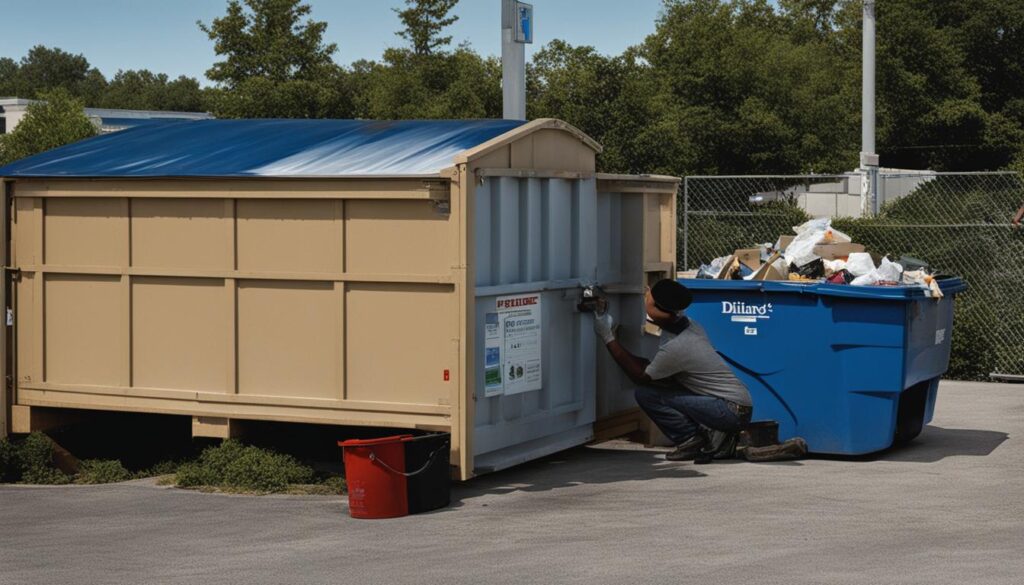
“Responsible dumpster diving involves adhering to store policies and norms while minimizing any negative impact on the environment and businesses.”
– Dumpster Diving Expert
| Tip | Benefits | Considerations |
|---|---|---|
| Observe Store Operating Hours | Minimizes the risk of being caught and avoids disrupting store operations. | Requires scheduling dumpster diving activities outside of store hours. |
| Stay In Designated Areas | Respects store boundaries and reduces the likelihood of encountering legal issues. | Limits the exploration to specific areas and potentially missed opportunities. |
| Leave No Trace | Keeps the environment clean and minimizes the impact on surrounding areas. | Requires proper waste disposal and additional effort to recycle or discard unwanted items. |
| Respect Private Property | Avoids legal repercussions and maintains ethical conduct. | Limits access to potentially valuable dumpsters on private property. |
| Do Not Damage Property | Preserves the integrity of the dumpster and avoids drawing unwanted attention. | Might restrict exploration or access due to cautionary behavior. |
| Keep a Low Profile | Reduces the chance of being observed or questioned during the activity. | Requires discretion and potentially limits the enjoyment of the experience. |
Understanding the Potential Risks and Consequences
Dumpster diving can be an adventurous activity, but it is essential to be aware of the potential risks and consequences involved. Engaging in this activity can expose individuals to various hazards and legal issues.
Risks of Dumpster Diving
When diving into dumpsters, there are several risks that individuals should consider. Some potential risks include:
- Trespassing: Entering private property without permission is illegal and may lead to legal consequences.
- Hazardous Materials: Dumpsters may contain broken glass, sharp objects, or chemicals that can pose a danger to personal safety.
- Injury: Climbing into or navigating through dumpsters can result in physical injuries, such as cuts, bruises, or sprains.
- Unforeseen Hazards: There is a possibility of encountering wildlife, insects, or other unexpected dangers while exploring dumpsters.
Consequences of Dumpster Diving
Engaging in dumpster diving activities can have various consequences, including:
- Legal Action: Depending on local laws and store policies, dumpster diving may be considered trespassing or theft, leading to legal repercussions.
- Fines: If caught engaging in unauthorized activities, individuals may face monetary penalties imposed by law enforcement or store owners.
- Damage to Personal Reputation: Dumpster diving can raise questions about a person’s ethics and integrity, potentially damaging their professional and personal reputation.
Considering the potential risks and consequences is crucial before deciding to engage in dumpster diving activities. It is essential to prioritize personal safety, legal compliance, and ethical considerations.
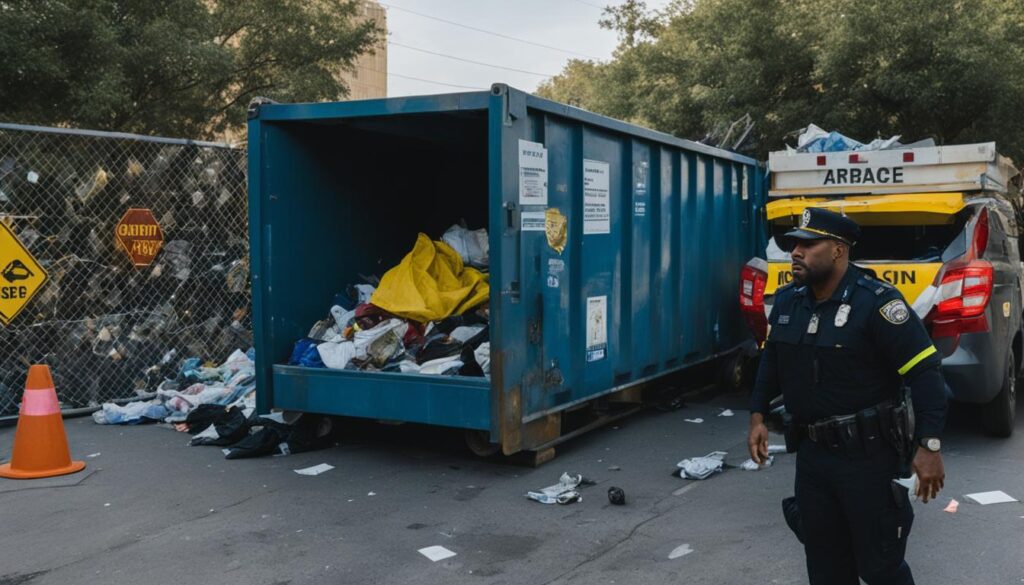
Testimonial on the Consequences of Dumpster Diving:
“I never thought dumpster diving could have serious consequences until I received a trespassing charge. It was a wake-up call that made me realize the importance of understanding the legal and ethical implications associated with this activity.” – Rebecca Smith
Alternatives to Dumpster Diving
If you are looking for ways to find affordable items or reduce waste, there are alternative options to consider. Thrift stores, consignment shops, and online marketplaces for used goods can provide a more reliable and legal way to find affordable items. Additionally, practicing sustainable shopping, such as buying secondhand or supporting eco-friendly brands, can help reduce waste and support ethical consumption.
Thrifting is a fantastic way to discover unique and affordable items while also contributing to a circular economy. Many thrift stores offer a wide range of clothing, furniture, decor, electronics, and more. Not only can you find great deals, but you can also help reduce the demand for new products and extend the lifespan of existing items.
“Thrifting is like a treasure hunt—you never know what hidden gems you’ll find!” – Lisa, avid thrifter
Consignment shops are another excellent option for sustainable shopping. These stores specialize in selling secondhand goods on behalf of individuals. The items available in consignment shops are often in great condition and may include high-end designer brands. By shopping at consignment shops, you can give pre-loved items a new home and support local businesses in your community.
Online marketplaces for used goods, such as eBay, Craigslist, and Facebook Marketplace, provide convenient platforms to buy and sell secondhand items. You can browse through a wide variety of products, negotiate prices, and connect directly with sellers. Just be cautious and practice safe online shopping practices when engaging with other individuals.
To highlight the benefits of these alternatives, we’ve compiled a table comparing dumpster diving with other sustainable shopping options:
| Dumpster Diving | Thrift Stores | Consignment Shops | Online Marketplaces | |
|---|---|---|---|---|
| Affordability | Inexpensive or free | Affordable prices | Varies by item | Varies by seller |
| Legal | Potentially illegal | Legal | Legal | Legal |
| Reliability | Uncertain availability | Consistent inventory | Consistent inventory | Wide selection of items |
| Community Impact | May harm businesses | Supports local charities | Supports local businesses | Directly connects buyers and sellers |
| Circular Economy | Repurposing discarded items | Extending the lifespan of items | Extending the lifespan of items | Reducing waste through reuse |
By exploring these sustainable shopping options, you can make conscious choices that align with your values. Not only will you find great deals and unique items, but you will also contribute to a more sustainable future.
Conclusion
In conclusion, dumpster diving at Dillard’s and other stores raises important legal and ethical considerations. While it may be tempting to search for discarded items, it is crucial to take into account the potential consequences and the impact this activity can have on businesses.
Respecting store policies and norms is essential to ensure responsible consumption. By following these guidelines, individuals can avoid legal troubles and maintain an ethical approach to dumpster diving. It is crucial to be aware of the potential risks and dangers associated with this activity, such as trespassing and exposure to hazardous materials.
Moreover, exploring alternative sustainable shopping options can provide a reliable and legal way to find affordable items. Thrift stores, consignment shops, and online marketplaces for used goods are excellent choices that align with sustainable consumption practices. By opting for these alternatives, individuals can support ethical consumption, reduce waste, and contribute to a more sustainable future.
Source Links
- https://www.city-data.com/forum/fort-worth/138662-where-can-i-dumpster-dive-ft.html
- https://wpst.com/dumpster-diving-pennsylvania/
- https://thekrazycouponlady.com/tips/money/dumpster-diving

Subscribe to Our Newsletter

